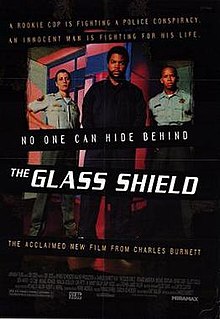The Glass Shield
| The Glass Shield | |
|---|---|

Theatrical releaseposter
|
|
| Directed by | Charles Burnett |
| Produced by |
|
| Written by |
|
| Starring | |
| Music by | Stephen James Taylor |
| Cinematography | Elliot Davis |
| Edited by | Curtiss Clayton |
| Distributed by | Miramax Films |
|
Release date
|
|
|
Running time
|
109 minutes |
| Country | United States |
| Language | English |
| Box office | $3.3 million (US) |
The Glass Shield is a 1994 crime drama film directed by Charles Burnett. It stars Michael Boatman and Lori Petty as rookie police officers who uncover a conspiracy around the arrest of suspect (Ice Cube). After a festival run, it was released in the United States on June 2, 1995, and grossed $3.3 million.
John "J. J." Johnson is a rookie police officer in the Los Angeles Sheriff's Department. Because of his inexperience and race, he experiences tension with his white colleagues as their first black deputy. Although he initially clashes with Deputy Deborah Fields, the department's first female deputy, they strike up a friendship. While on patrol, Johnson backs up Deputy Bono when he stops a black man, Teddy Woods, at a gas station. When Bono runs Woods' drivers license, he finds a warrant for his arrest. Woods reveals he has a stolen pistol in his car, and the police officers arrest him.
Deputy Fields is the second office to the scene of a murder, but Detectives Baker and Hall dismiss her observations. Mr. Greenspan says a black man murdered his wife in a botched robbery, and the detectives pressure Woods to confess after they trace his stolen pistol to the murder. Woods defiantly proclaims his innocence, frustrating his lawyer, James Locket, who advises him to show less attitude in court. At the same time, community activist Reverend Banks raises awareness of the death of a black prisoner whom he believes to have been murdered by the police while in custody. Johnson dismisses the concerns of his family and girlfriend, saying there is no evidence of this.
While coaching Bono on what to say at the trial, Johnson's commander, Clarence Massey, learns that Bono stopped Woods because of his race. Frustrated, Massey instructs him to come up with a better excuse. Bono suggests a traffic violation and later requests that Johnson back him up. Johnson agrees, and Massey praises him for his loyalty and dependability while chastising Fields for her refusal to fit in better. At the trial, Locket points out holes in the police testimony, making Johnson wonder if he made the right decision. Fields joins Johnson in investigating what really happened. With help from a whistleblower, they discover numerous cover-ups that involve Baker, Hall, and Massey.
As the trial progresses and Greenspan's testimony proves problematic, Massey has Baker murder Greenspan to prevent him from becoming a liability. Hall, sick from cancer, dies at the station. Tensions rise as Johnson and Fields continue pursuing their own investigation, and they become further paranoid when Johnson insists they were intentionally given faulty intelligence during a drug raid. After Fields is hospitalized following an assault, Johnson and Baker come to blows. Massey breaks them up and temporarily places Johnson in a jail cell. When released, he delivers incriminating evidence to Locket that implicates Baker in various crimes, including the murder of the black prisoner and framing Woods.
...
Wikipedia
